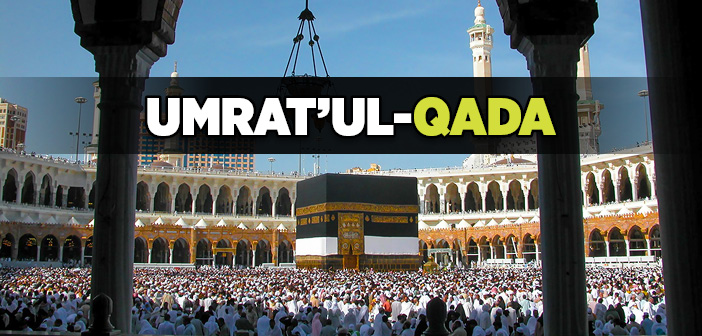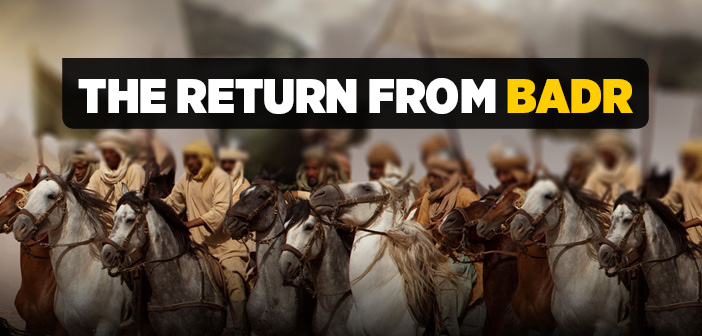What is umratul qada?
Performed to compensate the attempted umrah of a year ago which, thwarted by the idolaters, could not be carried out, this umrah has thus come to be known as umrat’ul-qada, that is the compensatory umrah.
A year had now passed since Hudaybiyah and the time had come to perform the umrah as agreed upon in the Treaty of Hudaybiyah. As they entered the month of Dhilqada in the seventh year of Hegira, the Blessed Prophet -upon him blessings and peace- ordered each person present at Hudaybiyah to begin preparing for umrah. He extended the command equally to other Muslims. Arabs from neighboring areas who happened to be in Medina at the time stated that they “…neither had food for the trip nor anyone to feed them!”
The Prophet of Mercy -upon him blessings and peace- then asked the Muslims of Medina to give charity, for the sake of Allah, glory unto Him, for those in need and see to what needs they may have, cautioning them that pulling their helping hands away from them would mean their ultimate destruction. The Believers, however, were facing similar problems of their own.
“What can we give as charity, Messenger of Allah, when we are unable to find anything?” they said.
“Whatever you have”, replied the Blessed Prophet -upon him blessings and peace-, “even if it be half a date…” (Waqidi, II, 731-732)
The Blessed Prophet -upon him blessings and peace- eventually set out from Medina along with two-thousand Companions, as well as around a hundred horses and, just in case, military equipment such as helmets, armors and spears. Some Companions reminded the Noble Messenger -upon him blessings and peace- of the condition laid down by Quraysh which prevented them from arming themselves except for the bare minimum considered acceptable for a traveler.
“We are not going to enter the Haram with those weapons; still, better we have them nearby in case of an attack”, the Blessed Prophet -upon him blessings and peace- explained. With two-hundred Companions, he then had the weapons sent to Batn-i Yajaj, at a distance of three miles from Mecca. (Waqidi, II, 733-734)
On they way, the pilgrims had a stopover at Abwa. The Blessed Prophet -upon him blessings and peace- had been granted permission by Allah, glory unto Him, to visit his mother’s grave. During the visit, he mended the grave with his hands and shed a few tears of grief. Finding difficulty in holding back their tears, the Believers also cried. Asked a few moments later as to the reason behind his tears, the Noble Prophet -upon him blessings and peace- said, “…for I remembered my mother’s mercy and compassion for me.” (Ibn Sad, I, 116-117)
In line with the terms of Hudaybiyah, the idolaters evacuated Mecca for three days and retreated to the nearby mountains, leaving the town at the Muslims’ dispense. Stirred from seeing Kaabah for the first time in seven years, the Believers enthusiastically began chanting, at once, the talbiyah.
According to the report of Ibn Abbas -Allah be well-pleased with him-, the Blessed Prophet -upon him blessings and peace- was met with and greeted by small children from the Muttalib Clan upon entering Mecca. He subsequently placed one of the children at the front of his saddle and another behind and rode into the town.[1]
In order to show the idolaters there was no truth behind their rumors that the Muslims had fallen weak from the fever of Medina, the Blessed Prophet -upon him blessings and peace- commanded them to walk quickly and with a touch of flamboyance.[2]
“May Allah have mercy on he who makes himself appear brawny to the idolaters!” he prayed. (Ibn Hisham, III, 424-425)
The Muslims who had at arrived in Mecca after traveling, under those conditions, a distance of over four-hundred kilometers from Medina, were indeed feeling the strain of the journey; yet they fully lived up to the Prophet’s -upon him blessings and peace- command and performed their umrah with dignity, exuding a intimidating might. They even ran flamboyantly during the first three ashwat, or laps, of the circumambulation, between where the two green poles stand today.
The idolaters, meanwhile, were curiously inspecting the Muslims. Had they been able to observe a glimpse of fatigue and slackness in the Muslims, they could have had other thoughts. Seeing with their own eyes the vivacity and exuberance of the Muslims, they could do little to hide their astonishment:
“Are these the people you say have fallen weak from fever? They are livelier and more animated than us!” they exclaimed. (Muslim, Hajj, 240)
The touching harmony of the adhan called out by Bilal Habashi from the roof of Kaabah that day, while stirring Muslim hearts, added to the bewilderment of the onlooking idolaters.
While the Blessed Prophet -upon him blessings and peace- was circumambulating Kaabah with his Companions, Abdullah ibn Rawaha –Allah be well-pleased with him- began reciting a poem.
“How long will you continue reciting that poem in the presence of the Prophet and in the Haram of Allah?” Omar -Allah be well-pleased with him- reproached. But the Blessed Prophet -upon him blessings and peace- himself intervened.
“Do not prevent him! By Allah in whose Hand of Might my life resides, his words are more damaging for Quraysh than flying arrows! Continue, Ibn Rawaha!” he said, before telling Abdullah to say:
“Say, there is no god and noone to be worshipped other than Allah. He is the One. He is the One who shall realize His promise. He is the One who gives strength to His soldiers. Only He is the One who routs the united tribes!”
The rest of the Companions repeated the words of Abdullah ibn Rawaha -Allah be well-pleased with him-. (Waqidi, II, 736; Ibn Sad, II, 122-123)
A graceful look of calmness was visible on the Muslims’ faces when they eventually returned to Medina after their three-day Kaabah visit. The first Kaabah visit had now taken place and the dream the Blessed Prophet -upon him blessings and peace- saw a year ago was realized in exactitude; a reality to which Allah, glory unto Him, gives mention in the Holy Quran, by alluding to the recent victory at Khaybar and heralding a soon-to-be triumph in Mecca:
“Certainly Allah had shown to His Messenger the vision with truth: you shall most certainly enter the Sacred Mosque, if Allah pleases, in security, (some) having their heads shaved and (others) having their hair cut, you shall not fear, but He knows what you do not know, so He brought about a near victory before that. He it is Who sent His Messenger with the guidance and the true religion that He may make it prevail over all the religions; and Allah is enough for a witness.” (al-Fath, 27-28)
The umrat’ul-qada left a profound impression on the Meccans and its impact soon saw the likes of Khalid ibn Walid, the future captor of Syria, Amr ibn As, the future captor of Egypt and Othman ibn Talha join the ranks of Islam.
As the Blessed Prophet -upon him blessings and peace- was departing from Mecca, Umamah -Allah be well-pleased with her-, the daughter of Hamza -Allah be well-pleased with him-, ran after him, pleading to be taken to Medina with him. Ali -Allah be well-pleased with him- took her by the hand and brought her to his wife Fatimah -Allah be well-pleased with her-, asking her to mind the child. But when they returned to Medina, a minor disagreement arose between Ali, Zayd and Jafar -Allah be well-pleased with them, who each wanted to be the one to take care of her.
“She is my cousin!” stated Ali -Allah be well-pleased with him-.
“She is my cousin, too, and on top of that I am married to her maternal aunt!” declared Jafar -Allah be well-pleased with him-.
“Well, she is my brother’s daughter!” then said Zayd, reminding them of how the Blessed Prophet -upon him blessings and peace- had made he and Hamza -Allah be well-pleased with him- brothers.
The Blessed Prophet -upon him blessings and peace- decided it would be best for Umamah to stay with her maternal aunt, pronouncing, “A maternal aunt is like a mother!” Then turning towards Ali -Allah be well-pleased with him-, the Noble Messenger -upon him blessings and peace- said:
“You are from me, I am from you!”
And to Jafar -Allah be well-pleased with him-, “You look so like me in appearance and conduct”, he said.
“You”, he then said to Zayd -Allah be well-pleased with him-, “are both our brother and friend!” (Bukhari, Maghazi, 43, Umrah, 3; Muslim, Jihad, 90)
Ali -Allah be well-pleased with him- explains, “Zayd became so elated when he heard the complements of the Messenger of Allah that he began spinning around the Prophet, on one foot. Then Jafar followed Zayd, behind him, in the same manner; and out of joy, I, too, started skipping on one foot behind Jafar.” (Ahmad, I, 108; Waqidi, II, 739)
[1] Bukhari, Umrah, 13; Libâs, 99.
[2] Bukhari, Hajj, 55; Muslim, Hajj, 240; Ahmad, I, 305-306.
Source: Osman Nuri Topbaş, The Prophet Muhammed Mustafa the Elect II, Erkam Publications





